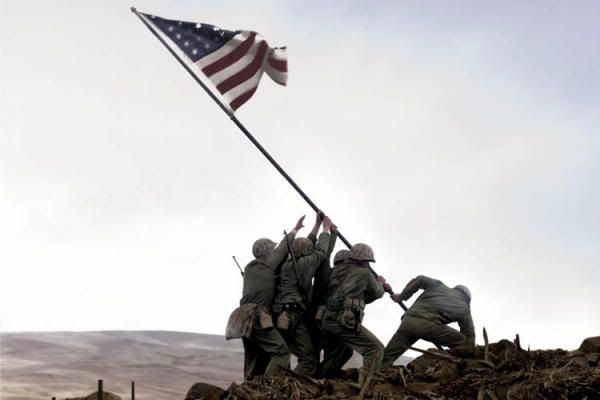Movie #9: Flags of our Fathers
 Watching this on Veteran's Day last week I couldn't help but be deeply moved by the endless heroism of our country's soldiers---even when their heroism is somewhat of a fabrication. I know I just spent my 30 words on that one sentence, but I'm making an exception for this review. While Flags of our Fathers was not as warmly praised as Clint Eastwood's companion film Letters from Iwo Jima, a film I've not yet seen, Flags of our Fathers stands on its own as a fascinating monument to the often murky definition of what it means to be a hero.
Watching this on Veteran's Day last week I couldn't help but be deeply moved by the endless heroism of our country's soldiers---even when their heroism is somewhat of a fabrication. I know I just spent my 30 words on that one sentence, but I'm making an exception for this review. While Flags of our Fathers was not as warmly praised as Clint Eastwood's companion film Letters from Iwo Jima, a film I've not yet seen, Flags of our Fathers stands on its own as a fascinating monument to the often murky definition of what it means to be a hero.Not terribly well-versed in history myself, I had grown up under the mistaken assumption that the flag-raising at Iwo Jima took place in the middle of a live battle---a sort of selfless rallying point to inspire the troops to battle on. I had no reason to think that beyond my mind seeking to ascribe meaning to this powerful image, but the real story is far more interesting. In truth, the famous photo was the second time the flag was raised. The first flag was raised and then quickly taken down so it could be kept as a souvenir by a commanding general. The first time the flag was raised the troops did take live fire. The second time they did not. The soldiers who raised the flag the second time, only half of whom would end up surviving the bloody battle of Iwo Jima, ended up being shamelessly celebrated by the U.S. Government for purposes of selling war bonds...all the while those surviving soldiers felt the guilt of not being the "authentic" first flag-raisers, a secret they were compelled to keep from the families of the dead soldiers who raised the flag first...but who received none of the accolades.
It seems like a minor distinction and, in fact, as the movie ultimately concludes, it is. The second flag-raisers, the ones who got all the glory, were no less heroic than the first group. Their guilt is understandable, but whether they were the first, second or last group of soldiers to raise a flag, whether they fired a weapon or not, whether they were injured or not, whether they were scared or not, they were all heroic. Not all of our heroes are equal, of course, but imagining the battle of Iwo Jima, where almost 7,000 American soldiers lost their lives, and where almost all of the 22,000 Japanese soldiers were either killed or committed suicide, it's unfathomable to me the level of bravery and personal fortitude these men demonstrated. That one picture can summarize it is amazing. That that one picture is something of a fraud, is even more so.
I'm a deeply cynical person, often critical of the way our country deploys its military. Seeing the horrors of that battle recreated for film certainly gives me even greater pause than before. Even so, I feel compelled to declare to those who would accuse me and others like me of believing otherwise, my support and compassion for our soldiers, from yesterday, today and tomorrow, is unwavering. In fact, those of us who prefer a more judicious use of our men and women in uniform do so for precisely that reason. I'm not the most patriotic person I know, and perhaps I might even be the least...but watching Flags of our Fathers makes it difficult to maintain such a cynical front. I do love my country...and after watching this movie I love it all the more.
Grade: 9/10


2 Comments:
This comment has been removed by the author.
very well put, thank you.
Post a Comment
Subscribe to Post Comments [Atom]
<< Home